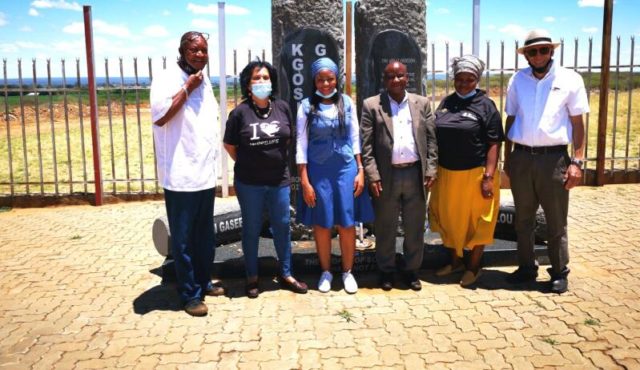Today the grave site is almost inaccessible, with no road signs marking its location, while the road leading to the site has become a dumping area for locals.
THE CHIEF of the Batlhaping Ba-Ga-Mothibi tribe, Kgosi Ponatshego Mothibi, has called on the Northern Cape government to maintain and upgrade the grave site of Kgosi Galeshewe, situated near Magogang, outside Hartswater.
Speaking at a visit to the grave site during this week’s summer campaign launch by the Northern Cape Tourism Authority (NCTA), Mothibi called for the development of the area and also pointed out the need to ensure that current and future generations knew the role played by Kgosi Galeshewe.
The tombstone, bearing the words “The People of South Africa shall not forget”, commemorates the place where Kgosi Galeshewe died in 1927.
The site reminds visitors that Kgosi Galeshewe “resisted the seizure of our land in rebellions against British colonialists and the Boers” and “serves as a reminder of our many fearless kings, who were tortured, imprisoned and killed in defence of our national heritage”.
The grave site, situated on the border between the Northern Cape and North West provinces, was unveiled in 2008, shortly after the 80th anniversary of Kgosi Galeshewe’s death, in honour of him and two of his cousins, Kgosis Gasebake and Tlou, during a Heritage Day Celebration at his family homestead Magagaaphiri.
“The processes of consultation with the custodians Kgosi Galeshewe’s memories led us to an overarching context of reference and meaning to those archetypal stories that transcended suffering within which most of the Batlhaping and South Africans at large are able to locate meaning and identity. At long last the resting place of the Batlhaping leader was made visible and also looking respectable for a man of his stature. Kgosi Galeshewe, the brave Batlhaping leader who has been an epitome of most South African’s aspirations that wanted to see our country free of colonial rule. We celebrated with great vigour Galeshewe’s struggle against injustices perpetrated by the British against the Batlhaping during their quest for land in the Taung area during the celebrations,” the director of the McGregor Museum at the time, Colin Fortune, said in the museum’s annual report for 2007/8.
Today, however, the grave site is almost inaccessible, with no road signs marking its location, while the road leading to the site has become a dumping area for locals.
Part of this week’s visit to the site, Fortune, who is now chairperson of the NCTA, pointed out that earlier visits by McGregor Museum staff to the area had revealed the ruins and stones where Kgosi Galeshewe and his family had lived. “It was still as it was in 1927 when he died. The dump site revealed materials that were used by the family, including the remains of cups and bones.”
Fortune added that the levelling of the area had, however, resulted in the loss of rich archaeological material. “This is a site where people lived for hundreds of years, it is not a new site,” he pointed out, adding that this should be a pilgrim site where children could be brought to learn about the contribution of leaders like Kgosi Galeshewe.
Speaking on behalf of the family, Ditshwano Gaanakgomo pointed out that Kgosi Galeshewe had given his life to save his land. “This was true leadership and that is why he was arrested. When he was released, he settled in Kimberley, where there is a township in Kimberley named after him. He stayed there for five years but then came back to where he is buried today.”
Gaanakgomo also pointed out that this was the history that the family would like to see the children of today being taught. “However, we have not seen any seriousness from the side of the provincial government. The tombstone was erected in 2007 but there has been no further development. This is very saddening for us because many promises have been made but we are still waiting. It is our concern that the grave is not maintained and has also been subjected to theft.”
He also expressed concern that because the site was situated on the border of the North West and the Northern Cape, the issue of who was responsible for the upgrading and maintenance of the site had also arisen. “We have never been part of the North West. We have always been in the Northern Cape.
“We are still not free from what Kgosi Galeshewe was fighting for. We are still fighting for our right to be in the Northern Cape and we are pleading that, going forward, the border will not be an issue.”








